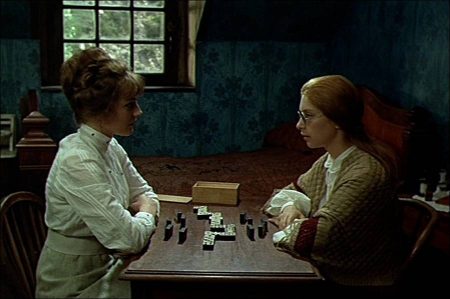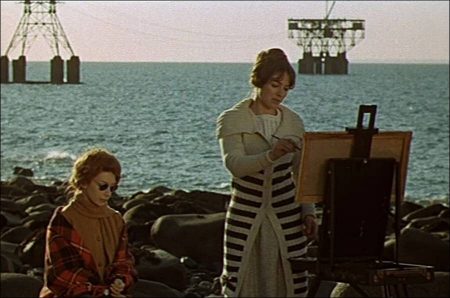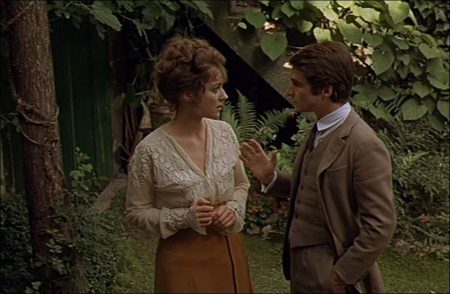Two English Girls movie storyline. At the beginning of the 20th Century, the English teenager Ann Brown travels from Wales to Paris. There she befriends Claude Roc and invites him to visit her hometown, where she lives with her mother and her younger sister Muriel. When Claude arrives at her home, both Ann and Muriel become his close friends – but Ann pushes Claude towards Muriel and they fall in love with each other.
However their mothers propose they separate for a year and do not communicate to see if they have real feelings for one another. But after six months in Paris, Claude is seduced by many lovers and sends a letter to Muriel calling off their commitment. When Claude meets Ann in Paris later, they have a love affair; but Claude still has feelings for Muriel.
Two English Girls (original French title: Les Deux Anglaises et le Continent, UK Title: Anne and Muriel), is a 1971 French romantic drama film directed by François Truffaut and adapted from a 1956 novel of the same name by Henri-Pierre Roché. It stars Jean-Pierre Léaud as Claude, Kika Markham as Anne, and Stacey Tendeter as Muriel. Truffaut restored 20 minutes of footage, which fills out the characters, before his death in 1984. The novel was first published in English in 2004, translated by Walter Bruno and published by Cambridge Book Review Press, Cambridge, Wisconsin.
About the Story
The film begins in Paris around the year 1902. The narrator (Truffaut himself) explains that Claude Roc and his widowed mother are visited by Anne Brown, daughter of an old friend. Anne invites Claude to spend the summer on the coast of Wales with her widowed mother and sister, Muriel. While she enjoys Claude’s company, her hope is that he may be a husband for her introverted sister, who has problems with her eyesight.
In the event, Claude and Muriel do start to fall in love and Claude overcomes her initial resistance and persuades her to agree to marriage. Madame Roc, supposedly concerned about their poor health and with the agreement of Mrs Brown, says they must live apart for a year without any communication before getting married.
Returning to France, Claude moves in artistic circles and has affairs with a number of women while Muriel in Wales keeps a diary and becomes increasingly despondent. Claude, with his mother’s encouragement, writes to Muriel, breaking off the engagement, as he wishes to be free to focus on his business pursuits. Muriel is devastated. Anne leaves home to study sculpture in Paris, where she loses her virginity to Claude.
She agrees to have a non-exclusive affair with Claude, enabling him to continue to have affairs with other women, and eventually has a concurrent relationship with Diurka, a dashing publisher who then takes her off to Persia with Claude’s encouragement. Muriel sends her diary, which includes details of her experience of a childhood lesbian event and her consequent prolonged struggle against an urge for masturbation, to Claude, who publishes it against her wishes.
Muriel comes to Paris and she and Claude rekindle their love. However, when Muriel is told by Anne of Claude’s affair with her, at Claude’s insistence, she collapses into deep depression and returns to Wales. Anne has become engaged to a Frenchman called Nicholas but falls ill and also returns to Wales, dying among her family with Diurka at her side.
Diurka tells Claude that Muriel is leaving home to take a job in Belgium. Claude meets her ship at Calais and they spend that night together in a hotel, during which Muriel also loses her virginity. In the morning, she says they must now part for ever as Claude is unsuited for matrimony, despite his renewed offer of marriage.
Later, she writes to say she is pregnant, raising Claude’s hopes of marriage, but a second letter says she hwas mistaken and their relationship is truly at an end. He later hears that Muriel has married and is a schoolteacher with a daughter. Claude turns the whole saga of his relationship with the sisters into a novel, which is published by Diurka.
Two English Girls (1971)
Directed by: François Truffaut
Starring: Jean-Pierre Léaud, Kika Markham, Stacey Tendeter, Sylvia Marriott, Marie Mansart, Philippe Léotard, Irène Tunc, Mark Peterson, David Markham, Georges Delerue, Marcel Berbert, Annie Miler, Christine Pellé, Jeanne Lobre, Marie Iracane
Screenplay by: François Truffaut, Jean Gruault
Production Design by: Michel de Broin
Cinematography by: Néstor Almendros
Film Editing by: Yann Dedet
Costume Design by: Gitt Magrini
Makeup Department: Simone Knapp
Music by: Georges Delerue
MPAA Rating: None.
Distributed by: Valoria Films
Release Date: November 18, 1971
Views: 198



